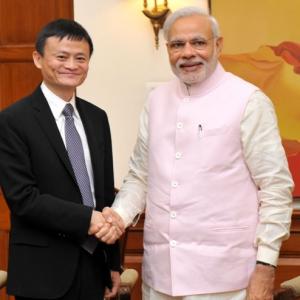E-commerce companies are partnering with brands to bring returned products back into the market and improve sales.
 High return rates in the e-commerce space are making a dent in the margins of e-retailers.
High return rates in the e-commerce space are making a dent in the margins of e-retailers.
Given their lenient return policies, the return rate in the sector is in the range of 15 to 20 per cent and can be as high as 40 per cent in case of cash on delivery.
On an average $20 billion (Rs 1,20,000 crore) worth of products are returned annually in the country.
"Inventory is the biggest pain point for brands, retailers and merchants. Selling refurbished products can help cut down the inventory levels of retailers," says Amit Gupta, co-founder and director at Surpluss.in.
In a sense, getting returned goods back into the market can help e-retailers cut costs related to the return of a 'new' sold item.
These as-good-as-new products, if not handled properly, could land up in the unorganised/grey market.
"Holistic supply chain management is a key building block of the e-commerce ecosystem. So far in India less than $100 million investment has gone into return management while it should be much more.
In developed countries, 10-15 per cent of the money invested in the e-commerce ecosystem goes into the back-end, warehousing and logistics infrastructure. The back-end is as important as last mile delivery," says Hitendra Chaturvedi, CEO, GreenDust.
Unlike the grey market, refurbished products sold by organised refurbished-goods players such as GreenDust and ValueCart come with a bill and a warranty.
eBay India, which took a plunge into the refurbished goods market in August, has so far tied up with 15 organised refurbishers such as GreenDust, ValueCart, Budli, My Return Solutions.
"These organised players add value to our platform. They have a quality check facility in place and validate every product before bringing them to the platform. They also provide seller warranty," Pankaj Ukey, director, seller service and category, eBay India.
The organised refurbished goods market in India is close to around $500 million (Rs 3,000 crore or Rs 30 billion).
Going by the 15 per cent average return rate in the industry, this market is set to reach $17 billion (Rs 1,02,000 crore or Rs 1,020 billion) by 2020.
While the opportunity is huge, so far, a majority of the sellers in the refurbished goods space fall in the CDIT (consumer durable information technology) space. And rightly so.
The category already comprises more than 40 per cent of e-commerce business.
There are two types of products being sold under the refurbished category.
One, unboxed, where the product had been returned to the manufacturer without being used.
Two, products with minor damages caused during shipment or products that were used but returned within the return period of 15 to 30 days due to 'customer remorse'. It also includes products used for little less than a year.
"The smartphone market is becoming mature and consumers are exchanging their phones within 12 months. These phones, which are perfectly new and still selling in the market, also find their way into the refurbished goods market," says Anshul gupta, research director, Gartner.
The challenge, however, is that the market for refurbished goods is unorganised in India.
"In the case of exchange offers, sometimes, old phones that are exchanged are not reprocessed but are circulated back into the market," says Gupta.
The early movers
The refurbished and unboxed category has a multi billion-dollar potential, especially in a price sensitive market like India because the discounts offered are in the range of 20 per cent to 30 per cent and products are as good as new.
"Selling refurbished products is a win-win for both OEMs and e-retailers. On one hand it helps OEMs clear up the inventory faster, on the other, it enables e-commerce platforms offer more choices at lower costs. This drives conversions," says Praveen Bhadada, partner and practice head, Zinnov.
Even as brands like Xiaomi and Samsung are refurbishing their own products and giving brand warranty on the same, not many OEMs find this sustainable. "As return is a very small percentage of their forward business, it does not make economic sense for OEMs to repair and refurbish themselves. Some also have authorised vendors for refurbishing. GreenDust is working with many brands on this front," says Chaturvedi of GreenDust.
GreenDust has a backward supply-chain agreement with marketplace players Flipkart, Amazon and Snapdeal to handle their returned goods.
Returns are sourced (at discounted rates) and brought into the market at around 30 to 35 per cent discount to the fresh stock with one-year extended warranty by GreenDust.
"We are becoming channel agnostic and are also selling refurbished products on other e-commerce sites, thus saving money on marketing. The company crossed $250 million in revenues last financial year.
Another player, Overcart.com, which sells products refurbished only by OEMs, sources the products from manufacturers like Xiaomi, One Plus, Acer and from both offline and online retailers.
"There is a problem of return both in the online and in the offline space. On an average, 8 per cent of the products are returned across categories but in the case of online, the return rate is higher.
Overcart sources products directly from retailers, run quality checks before listing them on the site.
It sells both unboxed, end-of-life and refurbished products. Our strength lies in quality checking. Products that need refurbishing are sent back to the OEMs," says Alex Souter, co-founder, Overcart.com.
"Generally retailers, both online and offline, don't have the core process to handle returns and unsold inventory.We make it profitable by helping them get maximum realisation on their returned and unsold stock," says Souter.
A majority of Overcart customers are from tier-II and tier-III cities. "Our USP lies in our ability to do quality checks and liquidate products fast," adds Souter.
ShopClues, which added a category of unboxed products on its website in August, has witnessed 2X growth in a month.
Its unboxed category includes brands like Samsung, Asus, Lenovo, Xiaomi and One Plus, among others.
Says Nitin Kochhar, AVP, categories, ShopClues, "We have tied up with merchants who have quality check facilities and partnerships with brands.
We offer six months' brand warranty on refurbished products."
Evidently, refurbished products require an additional layer of quality control by merchants.
At ShopClues, returned goods go back directly to merchants. If the merchant has the infrastructure to repair the product they do it or else the product goes to the service centre of the brand and the merchant later lists it as 'refurbished' on the site.
Marketplace player Surpluss.in, which operates in the end-of-life, unboxed and pure refurbished categories, has tied up with brands such as Samsung, LG and Xiomi to sell their refurbished products with six months' warranty.
It also recently entered into a tie up with Amazon, which is running a pilot in the refurbished space.
"About 99 per cent of the defects in the smartphone segment are software related. All the products sold by Surpluss.in are refurbished by the brands themselves and come with brand warranty," says Amit Gupta, co-founder and director at Surpluss.in.
While the market opportunity is huge, consumers are still wary about the quality of such products, which is an important decision-making criterion.
"The quality testing process along with the service assurance offered by OEMs/organised refurbishing players and e-commerce vendors could change the perception in a positive way," says Ukey of eBay India.
So what does the future look like?
While products refurbished by brands themselves carry a lot of credibility, experts say, going forward more OEMs will authorise partners to refurbish their products on their behalf and sell them.
"Market players need to build relationships with OEMs and work with credible suppliers. Getting consumer trust is important, so is creating awareness," sums up Pragya Singh, associate VP, Technopak.
Consumer protection is key: David Abikzir
Covering the refurbished goods market will be important for every serious e-commerce player.
Selling of refurbished products is a customer conquest strategy to meet the growing demand of shoppers for variety and product availability at various price points.
E-commerce players, which sell such products, communicate on the platform of their brand's involvement with social and environmental challenges.
However, given the number of consumers looking to purchase high-end products at lower prices, the phenomena of sales cannibalisation by refurbished products is set to accelerate with time. It will be coupled with a drift behaviour.
Look what happened to JD.com in China.
Many customers accused the e-commerce player of selling refurbished iPhones with fake/defective components. We see the same phenomena with counterfeit products in the luxury market.
With the growing market of refurbished products, this trend will be accentuated.
Thus e-commerce players serious about selling refurbished products first need to address two major challenges:
Consumer protection
The e-retailers that sell refurbished products must ensure that their supply channel is trustworthy.
E-ventures selling refurbished products should be accountable for product quality no matter where the goods come from.
They would face fraud accusations if they cannot prove that the products were purchased from authorised resellers.
Selection policy. E-ventures cannot escape from setting up a selection policy for refurbished products they offer to their consumers.
In a growing market, the right selection policy will build trust among consumers.










